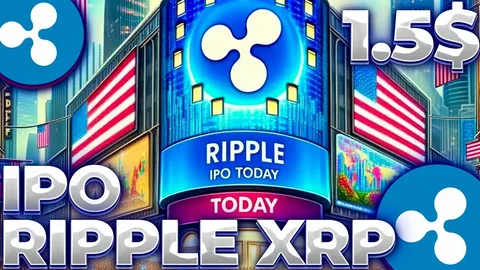Introduction
Ripple, a blockchain-based digital payment protocol, has been a beacon of innovation in the financial technology space. Despite its ongoing legal battle with the U.S. Securities and Exchange Commission (SEC), Ripple’s announcement of a potential Initial Public Offering (IPO) has captivated the attention of investors and the broader financial community.
This unprecedented combination of high-stakes legal drama and market optimism has sparked intense interest in the future of Ripple, the fate of XRP, and the implications for the cryptocurrency industry as a whole.
This blog post explores how Ripple’s IPO has made waves amid its legal proceedings with the SEC, the potential impact on the broader crypto industry, and the questions investors and enthusiasts are asking about the company’s future.

Ripple’s Legal Battle with the SEC: A Background
The SEC’s Allegations
The SEC filed a lawsuit against Ripple in December 2020, alleging that XRP, Ripple’s native cryptocurrency, is an unregistered security. The SEC claims that Ripple’s sale of XRP tokens to fund its operations constituted securities offerings that should have been registered. Ripple has vehemently denied these allegations, arguing that XRP functions more like a currency or commodity than a security.
This legal showdown has had significant ramifications for Ripple and the wider cryptocurrency market. Exchanges like Coinbase suspended XRP trading, causing its price to plummet. However, Ripple has continued to thrive in global markets, securing partnerships and expanding its technology’s adoption.
Legal Developments
Recent rulings have offered mixed signals. A partial victory in mid-2023, where the court ruled that XRP sales to retail investors were not securities, gave Ripple a morale boost. However, sales to institutional investors were deemed securities, leaving the case unresolved. These legal proceedings add layers of uncertainty, making the timing of an IPO both bold and strategic.
Why an IPO Now?
The Strategic Timing
Ripple’s decision to pursue an IPO amidst ongoing SEC legal proceedings is seen as a calculated risk. By moving forward, Ripple aims to reinforce its confidence in its legal position while tapping into the public markets for additional funding. The announcement has also bolstered XRP’s market sentiment, reflecting investor belief in Ripple’s long-term potential.
Launching an IPO at this juncture allows Ripple to control the narrative. It signals that the company has enough confidence in its operations, despite legal scrutiny, to meet the transparency requirements of a public company.
The Benefits of Going Public
An IPO would bring several advantages to Ripple:
- Capital Access: Ripple could raise significant funds to expand its operations and legal defense.
- Increased Credibility: A successful IPO would boost Ripple’s image, dispelling concerns about its ability to weather the SEC lawsuit.
- Global Reach: Ripple could further solidify its position in the global remittance and cross-border payment markets.
At the same time, an IPO would require Ripple to disclose additional financial and operational details, which could influence its legal case.
Market Reactions: Investor Optimism and Caution
Institutional and Retail Interest
The announcement of Ripple’s IPO has sparked significant interest among institutional and retail investors. Many see it as a rare opportunity to invest in a pioneering company at the intersection of blockchain and finance. The IPO could also serve as a barometer for the public’s confidence in the broader cryptocurrency industry amid increasing regulatory scrutiny.
However, the legal overhang remains a critical factor. Investors are closely monitoring how the SEC legal proceedings will affect Ripple’s valuation and its ability to operate within the U.S.
XRP Price Movements
Ripple’s IPO plans have had a noticeable impact on XRP’s market performance. The cryptocurrency has experienced price surges following positive legal developments and the IPO announcement. This volatility underscores the high stakes involved for both Ripple and its investors.
Broader Implications for Crypto
Ripple’s IPO has reignited debates about the regulatory future of cryptocurrencies in the U.S. If successful, Ripple’s move could pave the way for other blockchain companies to go public, despite regulatory uncertainties.
Ripple’s Vision Beyond Legal Battles
Expanding the Global Payment Ecosystem
Ripple’s core business focuses on revolutionizing cross-border payments using blockchain technology. Its partnerships with financial institutions worldwide highlight the scalability and efficiency of RippleNet. By going public, Ripple could attract more institutional partners, further embedding blockchain into traditional financial systems.
Pioneering Regulation-Friendly Crypto Practices
Ripple has positioned itself as a proponent of responsible regulation in the crypto space. By adhering to IPO disclosure requirements, Ripple could set a precedent for transparency and accountability, encouraging other crypto companies to follow suit.
The Long Game
Ripple’s leadership sees the IPO as a step toward solidifying its role as a key player in the digital economy. Despite legal challenges, the company remains focused on its mission to create a more inclusive financial system.
Conclusion
Ripple’s IPO announcement has undeniably sparked interest, creating a pivotal moment in the company’s journey and the broader cryptocurrency industry.
While the SEC legal proceedings add an element of risk, they also amplify the intrigue surrounding Ripple’s plans. A successful IPO could mark a turning point for the blockchain sector, signaling resilience in the face of regulatory scrutiny.
What are your thoughts on Ripple’s IPO plans during such a contentious period? Do you see it as a bold move or a risky gamble? Share your thoughts in the comments below—we’d love to hear from you!
0 Comments